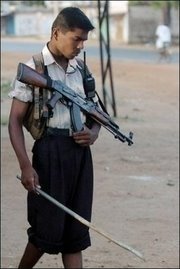EU Pushing Sri Lanka Peace To Critical Stage: Rebel Political Leader
The European Union's "shocking" move towards blacklisting Sri Lanka's Tamil Tigers will push the peace process to a critical stage, the head of the rebels' political wing has said.
The EU agreed in principle late Thursday to ban the Liberation Tigers of Tamil Eelam (LTTE) as a "terrorist" group, possibly as early as this week, diplomats said.
The move is "shocking and surprising," S. P. Thamilselvan, 39, the soft-spoken head of the Tigers' political office, told AFP.
"We consider that this move on the part of the EU will push the peace process, on which the Tamil people are banking their hopes, into a very critical juncture," Thamilselvan said in this northern town, which serves as the "capital" of rebel-held territory.
"This is only going to encourage the extremist-thinking elements in the south," he said.
The United States banned the LTTE in 1997, five years after India outlawed the group. Canada declared the Tigers "terrorists" last month.
Escalating violence since December has left a 2002 ceasefire between government troops and the guerrillas in force only on paper. More than 200 people died in April, the bloodiest month in four years.
Thamilselvan, speaking through an LTTE translator, said the international community accepted the Tigers "on an equal footing" during the peace process, an equality he said should be maintained.
The EU's decision last week came two days after a US State Department official said in Sri Lanka that Washington had encouraged the 25-member EU to ban the Tigers, declare them a terrorist group and cut off their international funding.
More than 60,000 people have died since 1972 during the rebels' fight for a minority Tamil homeland.
Placing the Tigers on the EU's terrorist list would result in a freeze on their assets, a move Thamilselvan said is meaningless.
"We are not in any way impacted by a ban or freeze of assets because we do not have any assets," he said, explaining the LTTE is funded by a tax structure within the area it controls. It also obtains revenue through other locally-based enterprises but has no assets, investments or vested interests abroad, he said.
Thamilselvan conceded that residents of Tiger-controlled territory, roughly estimated at 500,000-600,000 people, receive support from their overseas relatives.
He accused the Sri Lankan army of "killings at random" and acting through what he called agent provocateurs.
"If the international community unilaterally takes a decision without taking stock of the ground realities, the Tamil people have no alternative but to make a determination of their own," he said, adding "they have to make a determination of their own to fight against the oppressive regime."
The government's chief peace negotiator Nimal Siripala de Silva earlier this month told parliament that President Mahinda Rajapakse condemned a spate of killings that the Tigers have largely attributed to paramilitary units backed by security forces.
De Silva denied any government involvement in the killings and said security forces have been ordered to bring the perpetrators to justice.
Asked whether the current environment is leading towards a resumption of war Thamilselvan said: "The Tamil people and by extension their leaders, the Liberation Tigers of Tamil Eeelam, do not consider war as a resolution of the national conflict and they don't wish a war be started again."
But he said that "if a war is let loose" on them, they will have no option but to resist.
Well before Al-Qaeda attained notoriety, the Tamil Tigers had successfully employed suicide attacks against the Sri Lankan military, a tactic Thamilselvan said was adopted to inflict maximum damage on the military's heavy firepower with minimum loss of Tiger lives.
"It is not suicide," he said, explaining that the act is known as "self-gift", giving up oneself for the national good.
"It is always wrong to place us on a par with international terrorist acts that bring harm to innocent civilians or targets that are not military," he said.
Scandinavian truce monitors suspect Tigers are behind a series of Claymore mine attacks that have targetted the military but have also caused civilian casualties.
Thamilselvan said the Claymore attacks could be the work of citizens outraged at the military, but they were not the work of Tiger cadres.
"We do not have any of our cadres going into military occupied areas because we respect the ceasefire agreement," he said.
Copyright © 2006 Agence France Presse.


0 Comments:
Post a Comment
<< Home